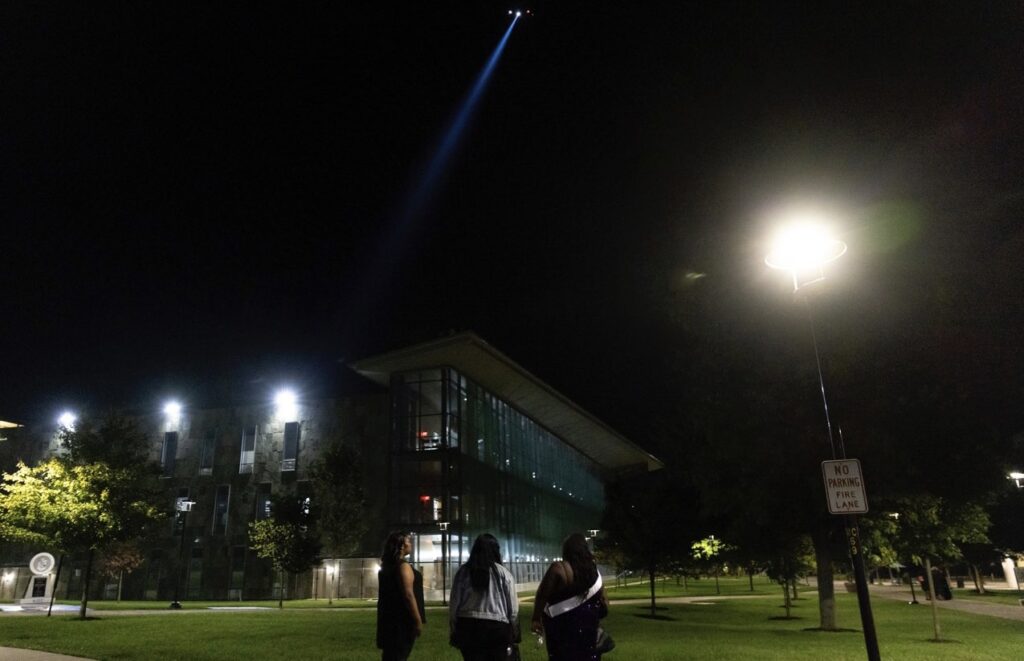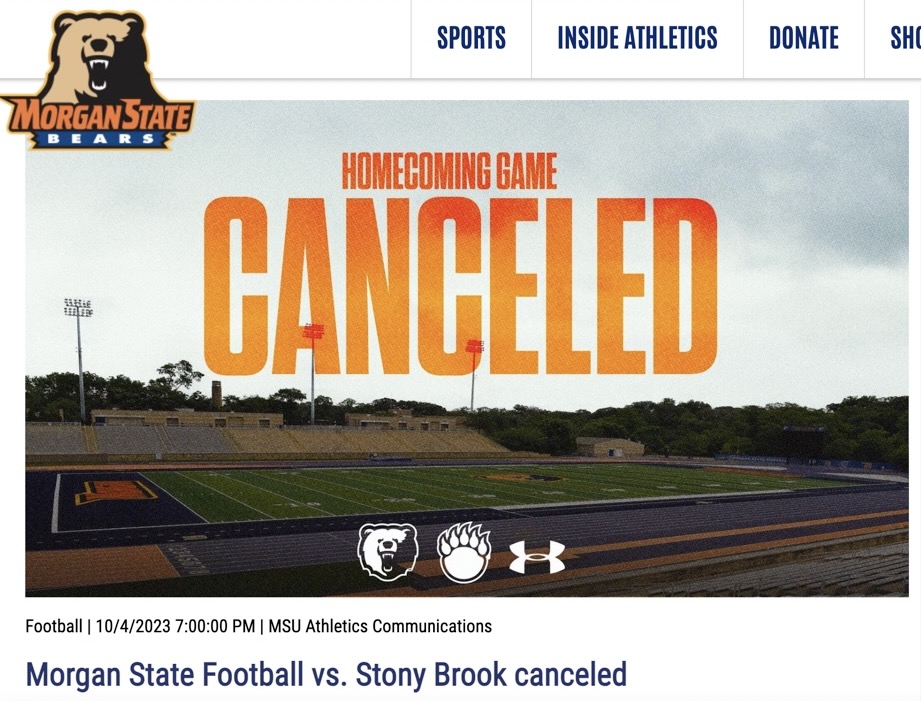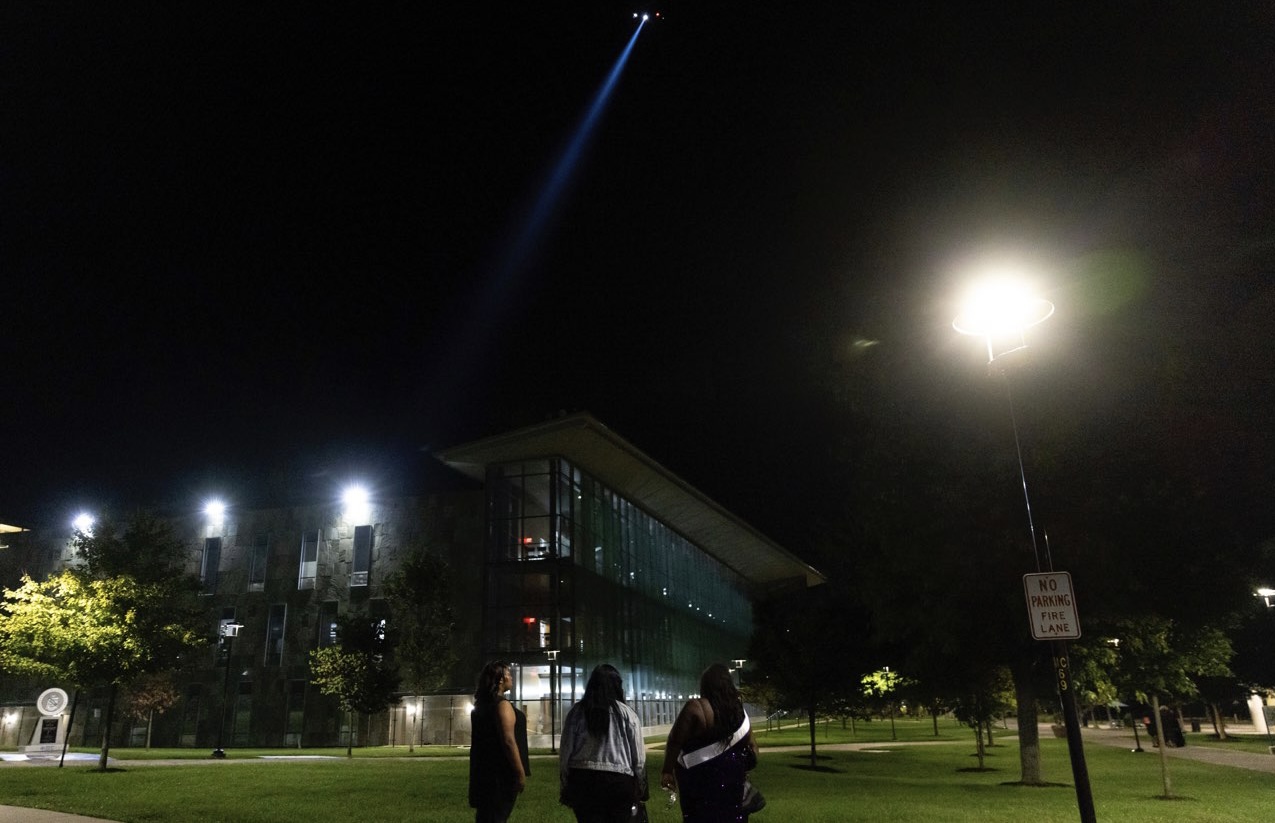BALTIMORE — On the night of Tuesday, Oct. 3, when Jose Verdejo of New Jersey heard from a family friend about a shooting at Morgan State University and possible casualties, he drove like a madman to Baltimore to find his daughter, a newly minted freshman.
“I’m not leaving until I speak to someone, and I can get assurances that I can leave my daughter in their care,” he told WJZ-TV, the local CBS affiliate, as he stood outside the predominantly Black campus around 5 a.m. Wednesday.
JoEllyn Jones, another Jersey resident, also hightailed it to Baltimore, where her daughter is a freshman communications major. She wanted to show her support and to stand in for parents who could not lay eyes on their own children. “You will be fine here,’ she assured students.

Felicia Thomas, a Baltimorean, made her way to the campus with a sign that said “Free Hugs from a Morgan Mom.” She planted herself where shaken students could avail themselves of a mother’s embrace. Her daughter, another freshman, is in the theater arts program.
“Don’t let this change your mind, because this can happen anywhere,” Thomas told students and parents. “Morgan is still a good school.”
The teen children of Verdejo, Jones and Thomas are among the 2,320 freshmen greeted by Morgan President David Wilson during the university’s Matriculation Convocation on Sept. 14. They are the largest entering class in the 156-year history of Morgan, a leader among the nation’s approximately 100 historically Black colleges and universities (HBCUs). They chose the expansive anchor institution in Northeast Baltimore for its academic programs as well as something increasingly valued in recent years: the HBCU experience.
Now, where Verdejo was having second thoughts, Jones and Thomas were mama bears fiercely supportive of the students and of the institution.
“I pray to God that our children understand that this is not a Morgan problem. This is a societal problem,” Jones said.
Navigating troubled waters is nothing new for HBCUs, many of which have struggled to maintain fiscal viability and academic excellence. Last year, noting that “more than one-third of our country’s Historically Black Colleges and Universities (HBCUs) have received bomb threats,” the Biden-Harris administration made resources available “to strengthen campus safety and security.” The racial reckoning unleashed in 2020, major philanthropic gifts, and the U.S.Supreme Court’s rejection of affirmative action in college admissions have been a boon to some HBCUs, including Morgan, which has experienced unprecedented growth that has challenged its ability to house the new students.
Since the shooting, support for Morgan has come from other HBCUs – Coppin State University in Baltimore held a prayer walk on its campus across town from Morgan – from public officials and, of course, from alumni.

One of them, Walter Fields, has attracted more than 1,300 views a day after this message was posted on a Morgan alumni page on Facebook: “My joy can’t be stolen and my love for my Alma Mater cannot be tested,” he wrote. “Too Black, too Strong! All day, Every day. I’m so glad I went to Morgan State!” Fellow alumni responded to his call with responses like “They better know it! We are Morgan Strong!”
This was Homecoming Week at Morgan, a much-anticipated annual affair that everybody knows means parties, concerts, class reunions, pep rallies, athletic events (volleyball and football for Morgan’s homecoming), a parade and a gala that usually raises thousands of dollars for scholarships. Blocks of rooms reserved for alumni in four Baltimore hotels were sold out, as was the gala. At the moment of the shooting, some of the students forced to duck for cover or to hide in bathrooms, rehearsal rooms, the library or wherever had been leaving the homecoming coronation pageant, which draws students in their royal finery and family members. They packed Carl J. Murphy Fine Arts Center to applaud not just Miss Morgan and Mr. Morgan, but also Miss and Mr. This, That and the Other for each undergraduate class and a plethora of campus organizations.
By Wednesday afternoon, all homecoming activities were canceled outright or postponed “until the perpetrator(s) of this atrocity have been found and brought to justice.” And the campus with a student body that has just topped 10,000, was eerily quiet.
Morgan was founded in 1867 as a Methodist seminary for Black males. The chapel has been a vital part of the HBCU experience even as the campus becomes more secular and, among the religious, more diverse. It has been a center for spiritual sustenance since 1941. During the student-led civil rights era that began in earnest in the 1940s at Morgan, it was a haven and a staging area for campaigns to end segregation at the nearby Northwood Shopping Center, as well as such landmarks as Ford’s Theater (where the actor-activist Paul Robeson joined the picket lines) and the Gwynn Oak Amusement Park that announced that it would open its doors to all on the same day as the March on Washington for Jobs and Freedom: Aug. 28, 1963. Many Baltimore activists had to make the difficult choice of where to be that day: Gwynn Oak or Washington.
Before the announcement that homecoming and everything else was canceled for the week, it was no surprise that many people instinctively turned to the chapel, where a noontime open-mic prayer service had been organized.
“Let common sense prevail,” Minister Clarence Wayman prayed. “Others may turn to violence, but we’re going to stay with love.”
One by one, for a little more than an hour, everyone from freshmen to upperclassmen to alumni who were in their shoes more than 50 years ago, as well as instructors, administrators, visiting chaplains, and journalists took turns at the microphone to offer thanks that no one had died, to ask God’s guidance and protection, and to boost each other’s spirits.
Chistopher Jones, a senior psychology major who is a resident assistant in the Thurgood Marshall Residence Hall where bullets pierced windows, prayed that students won’t self-isolate and succumb to fear but would rather experience “the spirits of your fruit, Father God, joy, peace, happiness, love, gentleness, kindness, gladness, patience, self-control, discipline.”
A woman who lives near the campus had come to volunteer in the food resource center, where students too afraid to go to the dining halls could grab some healthy food. At the prayer service, overcome with emotion, she expressed guilt that she felt that the neighborhood was too unsafe for her daughter, a student-athlete who chose an out-of-state PWI (predominantly white institution) instead of Morgan. As she faltered, the mothers Jones and Thomas were among the women who encircled her and offered reassuring words.
Like the prayer service itself, that moment of bonding was emblematic of the HBCU experience. Addressing the young people in the chapel, Dr. Juanita Gilliam, an alumna who is now an instructor, said: “I want the students who hear my voice and those who go out to share with other students to know that last night was not the HBCU experience.”
Outside the chapel, the school president’s executive council was meeting, police were stepping up their hunt for persons of interest, temporary campus repairs were being made, some students were relocating, some students were turning to counseling services, and parents were demanding answers.
Verdejo, the New Jersey father, said in those early hours Wednesday, “I’m not leaving until I speak to someone, and I can get assurances that I can leave my daughter in their care. So far, I don’t feel assured at all.”
Some parents and freshman learned only after the shooting that the last few homecomings at Morgan have been marred by gun violence, though nothing like the randomness and the scale of what occurred this week.
“Three years in a row during homecoming week! So that’s a regular occurrence now?” an incredulous Verdejo said. “You would think this place would be flooded with security.”
Christina Moody told NBC News: “Academically, Morgan has some great programs, but that’s a wash if we don’t feel secure enough with our students walking around the campus.”
The campus security team works in tandem with the Baltimore City Police Department that has a district outpost just steps from where the shooting occurred. Baltimore, like other major cities, has been fraught with gun violence over the years, though statisticians say that 2023 could end with fewer than 300 homicides for the first time since 2014. There’s only so much reassurance in that possibility when daily headlines report high visibility crimes like shootings and carjackings. But the latest report on crime on Morgan’s campus, issued two days before the shooting, shows that it is fairly crime-free.
Wilson has heard the parents and the students and is regularly reporting on what Morgan is doing beyond what it already had in place. He’s issued statements on Morgan’s website, in email messages to the Morgan community, in a video on YouTube, and in interviews such as one to WBAL-TV, the local NBC affiliate, on Thursday.
He also offers data and assurances as the father of a recent Morgan graduate.
“Morgan is my home,” Wilson said, “and we have 10,200 students here, and every single year, I feel like all of them — the thousands of them — are just like my son and daughter.”








